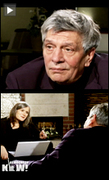
We broadcast from Bonn, Germany, where the thirtieth anniversary of the Right Livelihood Awards is being held. The Right Livelihood Award was established in 1980 to honor and support those “offering practical and exemplary answers to the most urgent challenges facing us today.” It has become widely known as the “Alternative Nobel Prize,” and there are now 137 laureates from fifty-eight countries. We speak with Jakob von Uexkull, the founder of the Right Livelihood Award. [includes rush transcript]
Transcript
AMY GOODMAN: I’m Amy Goodman, in Bonn, Germany, where the thirtieth anniversary of the Right Livelihood Awards is being held. The Right Livelihood Award was established in 1980 to honor and support those, quote, “offering practical and exemplary answers to the most urgent challenges facing us today.” It’s become widely known as the “Alternative Nobel Prize,” and there are now 137 laureates from fifty-eight countries. Unlike the Nobel Prize, which is awarded for Chemistry, Physics, Medicine, Literature, Peace, and Economics, the Right Livelihood Award has no categories.
Some eighty Right Livelihood Award laureates are gathered here in Bonn this week to discuss the world’s most urgent problems, from human rights abuses to climate change, environmental degradation to the fight for global justice.
Ole von Uexkull is the founder of the Right Livelihood Award — Jakob von Uexkull. He talked about this week’s thirtieth anniversary gathering.
JAKOB VON UEXKULL: I’m Jakob von Uexkull. I’m the founder of the Right Livelihood Awards, which are known as the “Alternative Nobel Prize.” And this meeting here in Bonn, Germany, is our thirtieth anniversary conference. We have these meetings every five years to enable the recipients to come together and interchange. I mean, these are people who are very courageous, who work for social transformation in many different fields, and they find it very valuable to be able to meet from time to time, exchange experiences and, you know, plan joint projects, and also to be encouraged and be informed by each other. But, of course, the host in this — here, the city of Bonn, expects more than that. So we also have two days of public meetings all over the region, all over this part of Germany, and in many, many different formats, different fora, where the recipients spread out. About eighty of the recipients are here.
The idea behind the award is to honor projects of hope, people coming up with exemplary solutions to the most urgent crises and challenges facing our world today. So it’s not an award for theory. It’s not an award for some invention somebody did thirty years ago. It’s an award for work in progress. So what you’re seeing here are people of, you know, very different ages and backgrounds, but they are all still very actively involved in work. We began as an environmental award, an award for human development, for poverty alleviation, for human rights. We then found that there are other areas which also need to be honored, to be recognized, even areas where there are already prizes, like the Nobel Prizes, because they only go to a certain category.
Especially you notice this in the economics field. The Economics Nobel Prize, which of course was not even created by Alfred Nobel, it’s very ideologically narrow. They will not talk about an economics which is not based on eternal economic growth. There is the US pioneer of steady-state economics, Professor Herman Daly, a man with an amazing output who really would deserve a Nobel Prize, but of course he’ll never get it, because he teaches the wrong kind of economics. So he is one of our award recipients.
There is Professor Manfred Max-Neef from Chile, the pioneer of barefoot economics, that actually help people to improve their quality of their lives without having to, you know, wait for trickle down from the rich. Again, in a man who would deserve a Nobel Prize, didn’t get it, so he got our award.
And even the late Professor Leopold Kohr, who was the teacher of E.F. Schumacher, who wrote Small Is Beautiful, who looked at the dangers of too big units and who said that, you know, because we as humans are fallible, it’s better to make small mistakes than big mistakes. And this was his argument against the worship of bigness. Again, an economist who has put his ideas into practice, but of course never got a Nobel, so he got our award.
There are examples like that even from the field of physics. A Physics Nobel Prize never went to a solar energy researcher. So the most successful photovoltaics researcher in the world, Professor Martin Green from Australia, is one of our recipients.
And we found, to give another example, that in the field of medicine, Nobel Prize would only go to a representative of modern Western orthodox medicine, but there are many other traditions of healing which are very successful. One is, actually, which has helped millions of people over hundreds of years, is homeopathy. So we honored the reviver of classical homeopathy, the Greek George Vithoulkas.
But most of our recipients are people who worked for human rights, for the environment, whose lives have been threatened in a couple of cases I know, especially one specific case. This man was already in the death cell being threatened by execution in Africa, and he told us that he thinks the award saved his life. And we’ve had other similar cases in Latin America. We have a Latin American recipient who told us the award made him so respected in his country that he was able to stop the planned return of the former dictator of that country.
So, really, I mean, profiles in courage, projects of hope, and therefore a very exciting meeting here in Bonn.
AMY GOODMAN: Jakob von Uexkull, the founder of the Right Livelihood Awards. This is Democracy Now!, democracynow.org, the War and Peace Report. We are broadcasting from Bonn, where over eighty Right Livelihood laureates have gathered.












Media Options